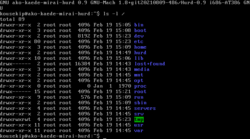 | |
 | |
| Developer | GNU Project Thomas Bushnell Roland McGrath Marcus Brinkmann Neal Walfield Samuel Thibault |
|---|---|
| Written in | Assembly, C |
| OS family | Unix-like |
| Working state | Current |
| Source model | Free software |
| Initial release | 1990 |
| Latest release | 0.9[1] |
| Repository | |
| Platforms | x86-64, IA-32, i686, ARM[2] |
| Kernel type | Multiserver microkernel |
| License | GPL-2.0-or-later[3] |
| Official website | www |
GNU Hurd is a collection of microkernel servers written as part of GNU, for the GNU Mach microkernel. It has been under development since 1990 by the GNU Project of the Free Software Foundation, designed as a replacement for the Unix kernel,[4] and released as free software under the GNU General Public License. When the Linux kernel proved to be a viable solution, development of GNU Hurd slowed, at times alternating between stasis and renewed activity and interest.[5]
The Hurd's design consists of a set of protocols and server processes (or daemons, in Unix terminology) that run on the GNU Mach microkernel.[4] The Hurd aims to surpass the Unix kernel in functionality, security, and stability, while remaining largely compatible with it. The GNU Project chose the multiserver microkernel[6] for the operating system, due to perceived advantages over the traditional Unix monolithic kernel architecture,[7] a view that had been advocated by some developers in the 1980s.[5]
- ^ "GNU Hurd 0.9, GNU Mach 1.8, GNU MIG 1.8 released". Retrieved 11 May 2018.
- ^ "GNU Hurd ported to AArch64, and more Hurd news". osnews.com. Retrieved 22 April 2024.
- ^ "COPYING - hurd/hurd.git - Hurd". Git.savannah.gnu.org. Retrieved 25 February 2019.
- ^ a b Cite error: The named reference
What Is the GNU Hurdwas invoked but never defined (see the help page). - ^ a b Tozzi, Christopher (2015-04-20). "30 Years On, HURD Lives: GNU Updates Open Source Unix Kernel". The VAR Guy. Archived from the original on 2015-04-24.
- ^ "What is a Multiserver Microkernel?". GNU. 2013-04-13. Retrieved 2015-08-11.
- ^ Cite error: The named reference
advantageswas invoked but never defined (see the help page).